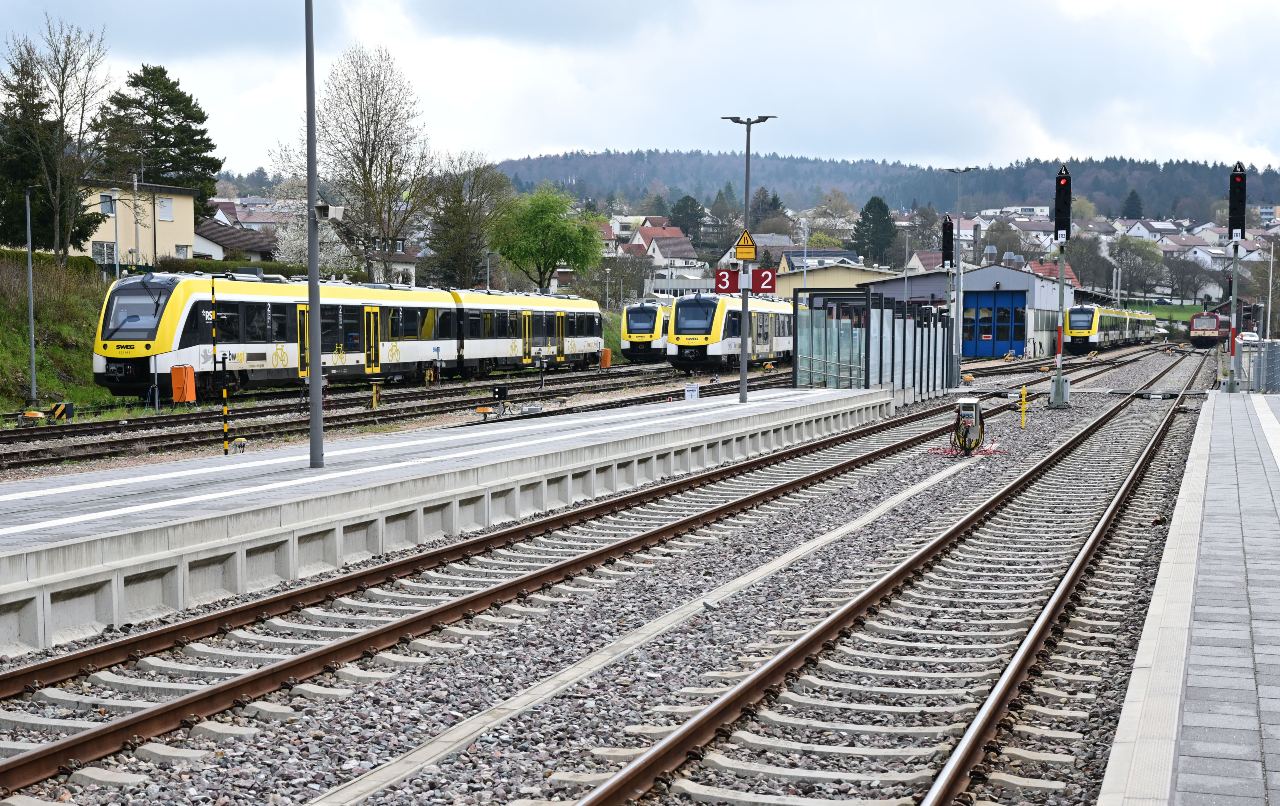The Verdi trade union called for public transportation workers to walk off the job in a number of warning strikes that will paralyse local transport in six federal states on Friday, February 21st.
Strikes are set to last all day – from the beginning of operations to the end of the day – and will impact passengers in Baden-Württemberg, Bremen, Hesse, Lower Saxony, North Rhine-Westphalia and Rhineland-Palatinate.
According to Verdi, almost 70 municipal transport companies will be on strike and around 53,000 employees will participate.
These one-day strikes in various municipalities are following a two-day BVG strike called by the Verdi union in Berlin that began on Thursday morning.
READ ALSO: How to get around Berlin during the two-day public transport strike
For passengers that rely on municipal buses and trains to commute to work or navigate their cities, Friday’s strike will bring some serious disruptions. But some transport services, such as regional trains and S-Bahn trains that are operated by Deutsche Bahn, will still be running.
Here are some of the ways you can get around during the strike.
Baden-Württemberg
The strike on Friday will affect a number of transport operators in cities and districts in Germany’s south-western state, including: Stuttgart (SSB), Karlsruhe (VBK), Freiburg, Heilbronn, Esslingen (SVE), Konstanz (Stadtwerke city bus).
Baden-Baden’s municipal utilities branch will also be affected, and in Ulm and Neu-Ulm, buses and trams will be stopped.
If possible, passengers can consider using regional and S-Bahn trains operated by Deutsche Bahn, as these are not affected by the strike. But be aware that these trains will likely be more crowded than usual due to the increased passenger volume.
Bremen
Employees of Bremen’s transport company, BSAG, will be on strike for 24 hours starting from 3am on Friday morning.
According to the BSAG website all train and bus lines are affected as well as night lines and dial-a-ride taxis. Customer centres at the main station, on Domsheide and in Vegesack will be closed.
Also some nearby cities including Osnabrück, Göttingen, Wolfsburg, Hanover and Braunschweig are affected by the strike.
However, services in Bremerhaven, Oldenburg, Wilhelmshaven will continue to run normally.
BSAG reportedly has no replacement plan in place. In some cases residents may need to seek alternatives such as driving or cycling. Regional trains and other Deutsche Bahn services will also continue running.

Hesse
In Frankfurt, the subway network (U-Bahn) and trams of the transport company VGF will not be operating on Friday.
In Wiesbaden, the ESWE Verkehr buses will be affected, and in Kassel, KVG trams and buses are affected.
As with previous strikes in the region, passengers in Frankfurt can turn to S-Bahn trains, and some buses that remain in operation.
READ ALSO: How to get around Frankfurt during the public transport strike
Lower Saxony
Many employees of the Hanover transport company Üstra will also stop work on Friday.
According to Üstra, affected routes include the light rail lines 1, 2, 3, 4, 5, 6, 7, 8, 9, 10, 11, 12, 13, 17 as well as the bus lines 100/200, 120, 121, 122, 123, 124, 125, 126, 127, 128, 129, 130, 133, 134, 135, 136, 137, 253, 254, 330, 340/ 341, 345, 346, 347, 348, 363, 371, 372, 373, 390, 420, 450, 470, 480, 581, 610/611, 616, 631, 800.
Hanover residents can turn to Regiobus lines which are not affected by the strike, but note that routes run by the Regiobus subcontractor Üstra Reisen will not be running.
As in other cities, S-Bahn and regional train lines will run as usual.
The on-demand Sprinti service will also be in use on Friday. However, there may be restrictions on this in some municipalities.
North Rhine-Westphalia
Passengers in North Rhine-Westphalia can expect significant disruptions as employees in more than 30 municipal transport companies in the state go on strike on Friday.
According to Verdi, transport companies affected include: the Rheinbahn in Düsseldorf, the KVB in Cologne, railways in the city of Monheim, Wupsi, Regio Mettmann, Stadtwerke Solingen and Wuppertal, Ruhrbahn, Stoag, DVG Duisburg, DSW 21, Bogestra, NEW mobil, Niag, Vestische and Regionalverkehr Münsterland.
Again, passengers in these cities can turn to transport services operated by Deutsche Bahn, like regional and S-Bahn trains, or may want to try alternatives like driving, bicycling and rideshares services.
Rhineland-Palatinate
Local public transport (ÖPNV) is to set to be affected by the strike in the state of Rhineland-Palatinate.
Verdi also announced that the following transport companies will be affected: KRN-Kommunalverkehr Rhein-Nahe, Mainzer Verkehrsgesellschaft, Stadtwerke Pirmasens Verkehrs, SWK Stadtwerke Kaiserslautern Verkehrs, and SWT AöR in the city of Trier.
Some bus and train drivers for Rhein-Neckar-Verkehrsgesellschaft (RNV) will strike across all six locations, including Ludwigshafen and Bad Dürkheim.
What are the strikes about?
These widespread transport warning strikes are linked to broader strikes for public sector workers. Verdi’s basic demands across industries include an eight percent pay rise (or at €350 per month) and more vacation days.
Verdi deputy head Christine Behle told the Rheinische Post that "The situation for public transport employees is extremely problematic. There are far too few staff, and the workload is constantly increasing."

But transport companies have pushed back, suggesting that the amount of wage increases the union is asking for as well as an increase in paid vacation days are untenable.
Negotiations are to be continued from March 14th to 16th in Potsdam.
In addition to the affected regions above, BVG employees in Berlin and employees in Mecklenburg-Western Pomerania will also be on strike on Friday.
Union organisers are planning demonstrations in some places around Germany. But some of the demonstrations have been cancelled or scaled down following the attack in Munich earlier this month where a car drove into a crowd of striking workers.

Comments